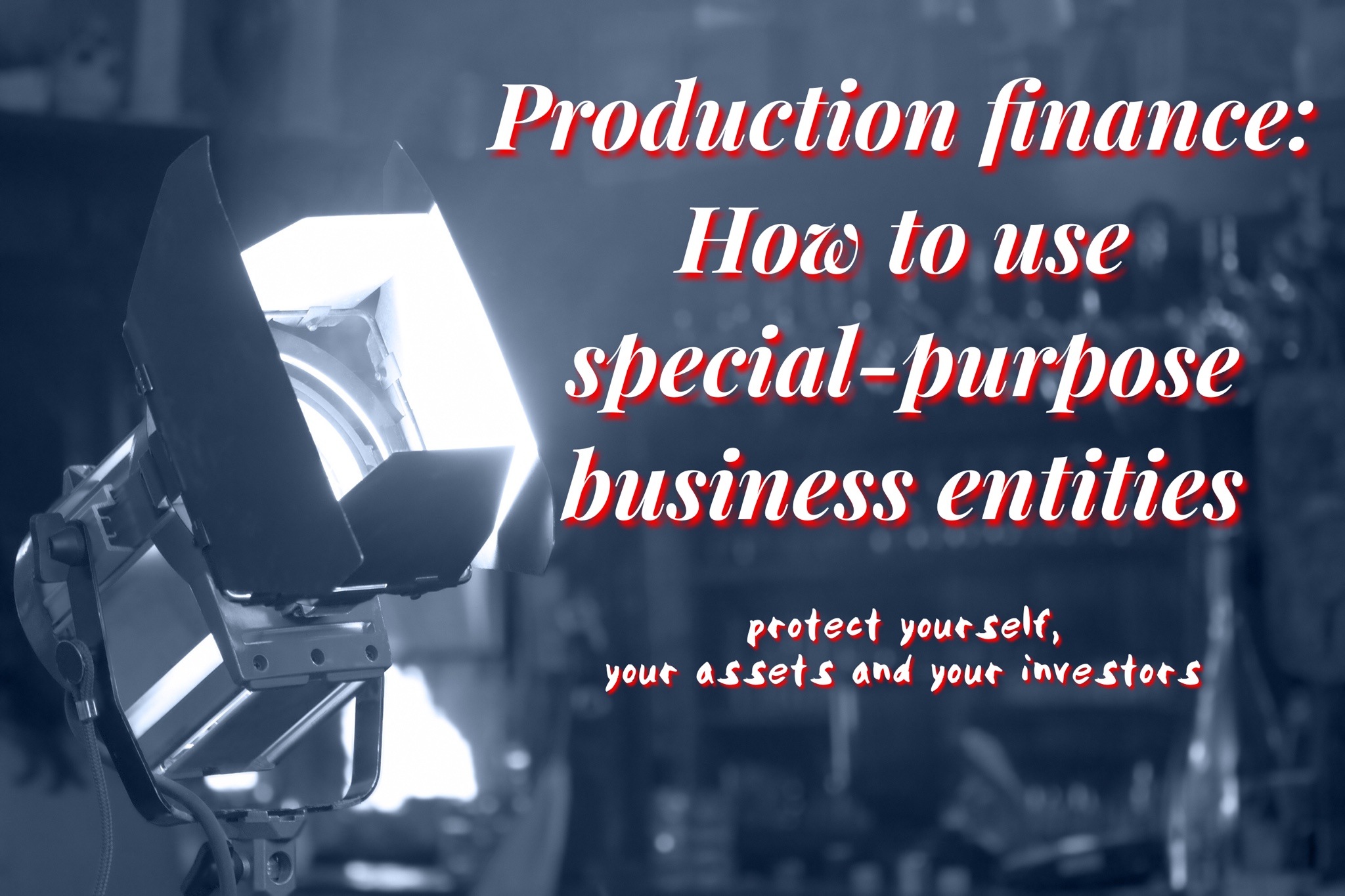How (and why) to set up a special purpose production entity for your film or show
What is a Special Purpose Entity (or Vehicle)?
An SPE is a legal entity (usually a limited liability company of some type or, sometimes, a limited partnership) created to fulfill narrow, specific or temporary objectives. In the case of film and theatre projects, the SPE would be created to produce a single film or production.
In a common scenario, the producer of the company may have several projects in various stages of production at any given time. This producer or company would establish a single, umbrella company (a “holding company”) which would then create individual SPE's (subsidiaries, essentially) for each project. This allows projects to be developed as wholly-owned or Joint-ventures.
Why form a Special Purpose Entity?
Using a Special Purpose Entity for each project carries a number of benefits. First, it permits clarity as to administration, control, and ownership of the company. The Company's Bylaws, Operating Agreement or Limited Partnership Agreement can identify the ownership structure, voting rights, and other rights of the various owners, and afford important protections for investors and the hands-on producers as well.
Secondly, the SPE provides the structure through which to sell equity investment. Depending in the entity type, investors may purchase shares of corporate stock, limited partnership interests, or LLC membership interests.
Next, the use of the SPE allows for the separation of assets of the particular project from unrelated ones. This keeps accounting much simpler, and prevents the cross-Collateralization of revenues and expenses from multiple projects.
Finally, and possibly most importantly, the use of Special Purpose Entities affords important protection against liability. Owners of Corporations, LLCs and Limited Partnerships are protected from the company's exposure to claims, and each shareholder, member or partner (as the case may be) has his or her risk of loss limited only to the amount invested.
How to form an SPE/SPV
Determine the Entity Type
There are a number of possible entity types available, but the specifics of each, and the factors to be considered in the selection of the appropriate form are too numerous to be addressed in an article of this type. This is not a decision to be taken lightly, as it can have long-lasting and wide-ranging consequences. Seek professional advice from financial, tax and legal advisers.
Select the Jurisdiction
Where to form your company is also an important consideration. While many companies are formed in the home-state of the founders, many others opt to form in distant states to gain advantages offered there, or avoid unnecessary costs at home. Many companies elect to be organized under Delaware's law, which offers a number of provisions that favor the mangement of the company, while still protecting those who invest.
But ultimately, the size and scope of the project in question may influence this decision. Since companies will have to “qualify” as so-called “foreign” companies in all states where they do business, the cost and tax savings state-to-state may be illusory.
Prepare & File the Papers
Forming an Entity to operate as a SPE seems deceptively simple. In most jurisdictions, it's a simple matter of completing a form (often called “Articles” or “Certificate” of Organization), or preparing a document outlining a few basics, name, address, number of shares/units available, etc. But in this simplicity lie traps for the unwary. Inclusion of certain provisions can alter the application of certain “default” state-law provisions, or change the rights and obligations of officers, directors and shareholder/members.
Depending on the type of organization and the jurisdiction, there may be other governing documents that need to be filed with the government.
Draft governing Documents
Next, the company will need a set of Bylaws or an Operating Agreement to set forth the specifics of how the company will operate, be managed, and financed. While default rules might be suitable for your business, it's likely that variations will be desirable.
Once the company is formed, it becomes a separate “person” in the eyes of the government, particularly for tax purposes. The company will need to obtain a tax-identification number, and make certain tax-elections that will influence how the business will pay its taxes, as well as how (and when) the owners will be realize their share(s) of company profits and losses.
Still another consideration is whether the company, if held by a very small number of stakeholders, will be subject to any voting agreements, or a buy-sell agreement governing how, when, and to whom an owner may sell his or her interest in the company.
Obviously, custom-tailored professional advice is called for in making these determinations. It is unwise and risky to rely on hearsay, popular belief, and out-of-context research in deciding on such matters.
When to form an SPV
Ideally, the SPV should exist before any assets are acquired, liabilities incurred, or investment accepted. In practice, this is quite difficult to achieve, but it certainly makes sense to form the entity before taking in investors' funds. Assets can be transferred into the company by the founders (often called “promoters”), and liabilities can be addressed through insurance policies and indemnity agreements. But with only a few exceptions, investments must be made in an existing company.
Should I use an online filing bureau to start my SPV?
“Would you stick your head in a machine that promises to give you a perfect haircut?”
Well, maybe if your head was the exact same size and shape as everyone else… and your hair is the same texture, length, moisture content, and so on, and you want the same basic haircut as everyone else who uses this machine gets.. then yes, you might. But, you know that you're not exactly like every other person who comes along… so you're going to go to a professional. A trained hairstylist who can take a look at you, help you figure out what kind of cut is best, and then do it so you look great.
Well, your business isn't the same as every other one. Heck, one SPV will vary in some ways from the next. You really need more than a plain-vanilla set up. Especially because you're going to be conducting a round of financing to fund your project, right? So the “standard” operating agreement isn't going to cover the bases properly.
And, let's face it, producing films, plays and musicals is not like making widgets.. A cookie-cutter approach to setting up the company is not the way to go.
A bad haircut will grow out if it's messed up. A badly structured company will be around a lot longer, and give you a whole lot more grief.
You want the people that are helping you with the production to be tuned in to the company structure and financing setup… So they should be the ones putting together the SPE as well. It'll save you time, hassle and money. Plus, there is the added advantage of one-stop shopping, so you have one less thing to juggle.
Conclusion
So, if you are financing a film, play, musical or other media project by taking in investment, loans or Presales, setting up a Special Purpose Entity is just the first step on the road to getting things up and running. Consult your lawyer about what type of entity is best for your next project.



